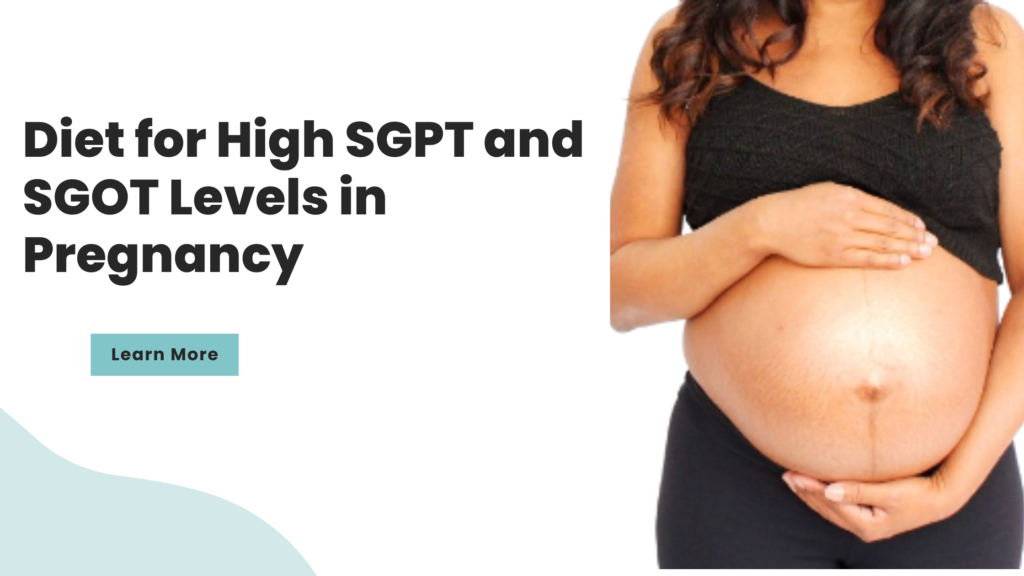
References
The liver is an essential organ responsible for various vital functions, including blood filtration, detoxification, and bile production. A healthy liver is crucial for a healthy body, especially during pregnancy when a woman needs to support her own health and the growth of her baby. However, liver conditions can lead to elevated SGPT and SGOT levels during pregnancy, raising concerns for expecting mothers.
This blog will address common queries related to lowering SGPT and SGOT levels through diet and lifestyle changes, as well as foods to avoid.
What are SGPT and SGOT?
Serum glutamate pyruvate transaminase (SGPT), also known as alanine transferase (ALT), and serum glutamic-oxaloacetic transaminase (SGOT), or aspartate transaminase (AST), are enzymes found primarily in the liver and heart. These enzymes play a crucial role in converting food into energy. Elevated SGPT and SGOT levels during pregnancy can indicate liver damage or other health issues. The normal range for SGPT is 4 to 36 units/liter, while SGOT levels should be between 8 to 22 units/liter. High levels of these enzymes may signal liver disease, while low levels can be associated with vitamin B deficiencies or alcohol use.
Causes of High SGPT and SGOT Levels in Pregnancy
Several factors can lead to elevated SGPT and SGOT levels, including:
- Cirrhosis (scarring of the liver)
- Hepatitis (inflammation of the liver)
- Hemochromatosis (excess iron in the body)
- Liver ischemia (reduced blood flow to the liver)
- Liver cancer
- Mononucleosis (a viral infection)
- Death of liver tissues
- Pancreatitis (inflammation of the pancreas)
- Harmful drug use
The Role of a Healthy Diet in Pregnancy
A nutritious diet during pregnancy is essential for providing the necessary nutrients for both the mother and the developing baby. While there is no specific diet for lowering SGPT and SGOT levels, incorporating a variety of foods can help ensure a balanced intake of nutrients. Pregnant women with elevated SGPT and SGOT levels should focus on including:
- Minerals: Iron, calcium
- Proteins
- Vitamins: A, B complex, C, and D
- Omega-3 fatty acids
- Fiber
- Antioxidants
Diet Recommendations for High SGPT and SGOT Levels
If you experience symptoms related to high SGPT and SGOT levels or if your test results indicate elevation, consult your healthcare provider for tailored advice. However, natural remedies and a balanced diet can help improve liver health. Here are some dietary tips to consider:
1. Balanced Diet
- Include a variety of foods: fruits, vegetables, grains, healthy fats, and dairy products.
2. Fruits
- Consume a daily serving of fresh fruits. Citrus fruits, apples, grapes, and berries are particularly beneficial due to their antioxidant properties that can improve liver health.
3. Vegetables
- Incorporate cruciferous vegetables (broccoli, cabbage, cauliflower) and leafy greens (spinach, kale, collard greens). These are rich in glutathione and provide essential vitamins and fiber.
4. Fish
- Add fatty fish like salmon, sardines, and tuna, which are rich in omega-3 fatty acids known to help reduce liver inflammation.
5. Nuts and Seeds
- Nuts (almonds, walnuts) and seeds (flaxseeds, chia seeds) are high in nutrients and healthy fats, beneficial for liver health.
6. Beverages
- Opt for green tea and moderate coffee consumption (limited to 200 mg of caffeine per day). Green tea may support liver enzyme function, while coffee can boost antioxidant levels in the liver.
7. Whole Grains
- Choose whole grain products like brown rice, oatmeal, and barley, which are high in fiber and can help regulate blood sugar levels.
8. Hydration
- Drink plenty of water to stay hydrated, as proper hydration aids liver function.
Note: Always consult with your doctor before making any dietary changes.
Sample Dietary Chart to Lower SGOT and SGPT Levels During Pregnancy
Breakfast
- One cup of green tea or black coffee
- Three to four servings of mixed berries (e.g., orange, apple, cherries)
- One cup of cereal with milk
- One-fourth cup of nuts and seeds
- Half cup of oats cooked with milk or water
- Two scrambled eggs
Lunch
- One slice of whole grain bread with a bowl of mixed vegetables
- Three to four ounces of tofu, fish, or lean meat
- One egg sandwich
- One bowl of crispy chicken salad
Dinner
- Half a cup of lentils or beans
- Three-fourths cup of brown rice with leafy vegetables
- Three-fourths cup of brown rice with mixed vegetables
- Steak tacos or baked fish with roasted vegetables
Foods to Avoid for High SGPT and SGOT Levels
In addition to including liver-friendly foods, it’s crucial to eliminate certain items that may harm liver health:
- Sugary Drinks: Regular consumption of sugary sodas can lead to obesity and liver damage.
- Fried Foods: Items like fries, chips, and pastries contribute to fat accumulation in the liver.
- Alcohol: Excessive alcohol intake is a leading cause of liver disease.
- High-Salt Foods: Processed and canned foods high in sodium can lead to water retention and stress on the liver.
- Processed Meats: Items such as bacon, hot dogs, and salami can damage the liver due to high saturated fat content.
Additional Activities to Complement Diet
Alongside a healthy diet, regular exercise is essential. If your pregnancy is progressing normally, consider incorporating physical activity:
- Aim for 30 minutes of exercise daily or 20 minutes for 3 to 4 days a week, both of which can improve overall health.
- Prenatal yoga is an excellent low-impact option for pregnant women.
- Always consult your healthcare provider before starting an exercise routine.
Conclusion
Maintaining good health during pregnancy is vital for your baby’s development. A balanced diet, along with the avoidance of harmful foods, can help keep SGPT and SGOT levels in check. If you have concerns about elevated enzyme levels during pregnancy, don’t hesitate to contact our personal care team for guidance. For more pregnancy-related information, visit our website, Aapka Care.



